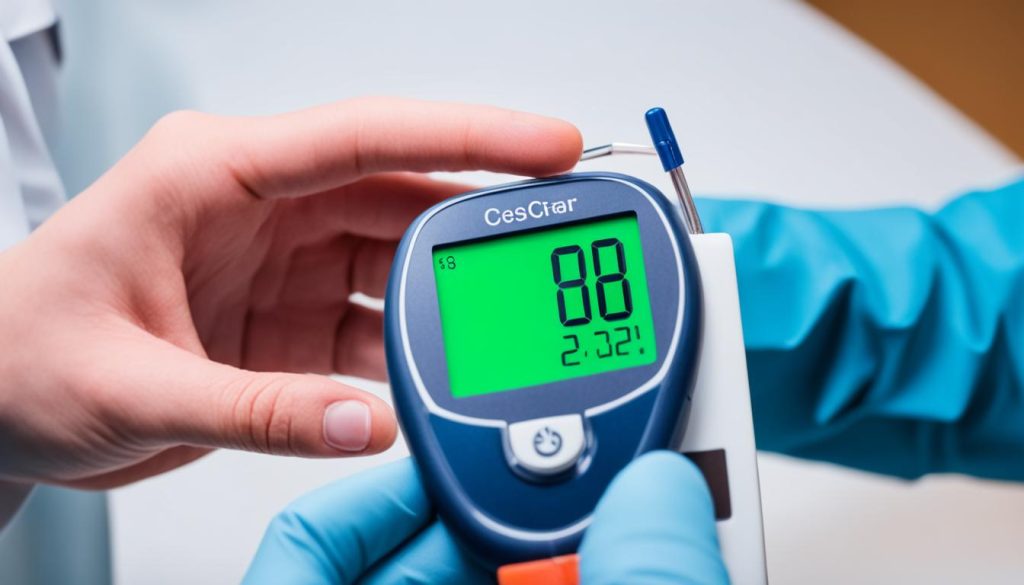High blood sugar levels, also known as hyperglycemia, can be dangerous and may require immediate action to bring them down. This article explores effective methods to quickly reduce blood sugar levels and manage them safely.
Blood sugar levels play a crucial role in overall health, and consistently high levels can lead to complications such as nerve damage, diabetic retinopathy, kidney problems, and heart issues. It is important to maintain blood sugar levels within a healthy range to prevent these complications and promote well-being.
In this article, we will discuss strategies on how to lower blood sugar quickly, when to seek medical attention, and practical tips for living healthfully with diabetes.
When blood sugar levels rise, it is essential to take immediate action to bring them down. By implementing the right techniques and making necessary lifestyle adjustments, individuals can effectively manage their blood sugar levels and reduce the risk of complications associated with high blood sugar.
Stay tuned for more information on how to reduce blood sugar levels immediately and gain control over your health.
Understanding Blood Sugar Levels and Hyperglycemia
High blood sugar levels, or hyperglycemia, can be caused by various factors. Some individuals may experience insulin deficiency, where the body does not produce enough insulin to regulate blood sugar. Others may have insulin resistance, where the body’s cells do not respond effectively to insulin. Certain medications, an unhealthy diet, a sedentary lifestyle, and stress can also contribute to high blood sugar levels.
Symptoms of high blood sugar levels may include extreme thirst, frequent urination, nausea, and fatigue. It is important to monitor these symptoms and take appropriate action to manage blood sugar levels effectively.
A blood sugar level above 180mg/dL is considered dangerous and requires immediate attention. It is essential to take steps to lower blood sugar levels and prevent further complications.
| Causes of high blood sugar levels | Symptoms of high blood sugar levels | Dangerous blood sugar level |
|---|---|---|
| Insulin deficiency | Extreme thirst | Above 180mg/dL |
| Insulin resistance | Frequent urination | |
| Certain medications | Nausea | |
| Unhealthy diet | Fatigue | |
| Sedentary lifestyle | ||
| Stress |
Understanding the causes and symptoms of high blood sugar levels is crucial in managing and regulating blood sugar effectively.
How to Reduce Blood Sugar Level Immediately?
To lower blood sugar levels quickly, there are several effective methods you can try. Here are some strategies that may help:
1. Taking Fast-Acting Insulin
If you are diagnosed with diabetes and have been prescribed insulin, taking fast-acting insulin can be an effective way to lower blood sugar levels. This type of insulin is designed to act quickly and bring down high blood sugar readings.
2. Engaging in Physical Activity
Exercise is another effective method to lower blood sugar levels as it increases insulin sensitivity, allowing your cells to better utilize glucose from your bloodstream. Aim for at least 30 minutes of moderate-intensity exercise, such as brisk walking, cycling, or swimming, to help lower your blood sugar levels.
3. Staying Hydrated
Drinking water can help dilute the concentration of glucose in your blood, thereby reducing blood sugar levels. Aim to drink plenty of water throughout the day to stay hydrated and help lower your blood sugar levels.
4. Eating High Protein Snacks
Choosing high protein snacks, such as nuts, Greek yogurt, or hard-boiled eggs, can help stabilize blood sugar levels and prevent spikes in glucose. Protein-rich foods digest more slowly, leading to a slower and more controlled release of glucose into the bloodstream.
5. Trying Home Remedies
Some natural remedies may have a positive impact on blood sugar levels. These include consuming cinnamon, apple cider vinegar, or bitter melon. However, it is important to consult with a healthcare professional before trying any home remedies to determine their suitability for your individual needs.
Remember, these strategies may help lower blood sugar levels, but they should not replace medical advice or prescribed treatments. It is important to work closely with your healthcare team to manage and monitor your blood sugar levels effectively.

When to Seek Medical Attention?
Blood sugar levels are an important indicator of overall health, and it is crucial to monitor them regularly. While mild fluctuations in blood sugar levels can be normal, levels that are consistently high may require medical attention. Elevated blood sugar levels can have serious consequences and may lead to complications if left untreated. Here’s what you need to know about when to seek medical attention for blood sugar levels.
Normal Blood Sugar Levels
Understanding normal blood sugar levels is essential for identifying when levels become abnormal. The chart below provides a guideline for normal blood sugar levels in adults according to the NHS (National Health Service):
| Blood Sugar Level | Classification |
|---|---|
| Between 4.0mmol/L and 6.0mmol/L | Normal fasting blood sugar level |
| Less than 7.8mmol/L | Normal blood sugar level after eating |
It’s important to note that individual blood sugar targets can vary based on factors such as age, overall health, and whether the person has diabetes. Consult with a healthcare professional for personalized blood sugar level recommendations.
When to Contact a Doctor?
If your blood sugar readings consistently exceed the normal range or if you experience symptoms such as frequent urination, increased thirst, or high levels of sugar in your urine, it is advisable to contact a doctor. These could be signs of uncontrolled diabetes or other underlying health conditions that require medical attention.
Emergency Situations
In some cases, high blood sugar levels can reach a critical point that requires immediate medical intervention. Seek emergency medical care if you experience symptoms of diabetic ketoacidosis (DKA) or hyperosmolar hyperglycemic state (HHS). These include:
- Confusion
- Nausea
- Shortness of breath
- Fruity-scented breath
If you are unsure whether your symptoms require emergency care, it is always better to err on the side of caution and seek medical attention promptly.

To better understand the significance of blood sugar levels, let’s take a look at a scenario:
John, a 55-year-old man with diabetes, checks his blood sugar level two hours after a meal. He measures a blood sugar level of 10.2mmol/L. Is this cause for concern?
According to the chart above, a blood sugar level of less than 7.8mmol/L is considered normal after eating. John’s reading of 10.2mmol/L indicates that his blood sugar level is higher than the target range, which may require intervention. It would be advisable for John to consult with his doctor to discuss his blood sugar management plan and make any necessary adjustments.
Complications of High Blood Sugar
Regularly high blood sugar levels can lead to various complications that can negatively impact overall health. Managing blood sugar levels through a healthy diet, regular exercise, stress reduction, and adequate sleep is crucial in minimizing the risk of developing these complications. Let’s take a closer look at some of the most common complications associated with high blood sugar:
Nerve Damage
Consistently elevated blood sugar levels can cause damage to the nerves throughout the body, leading to a condition called diabetic neuropathy. This condition can cause numbness, tingling, pain, or loss of sensation in the affected areas of the body. The hands and feet are often the first to be affected. Proper blood sugar control is essential in preventing or slowing down the progression of diabetic neuropathy.
Diabetic Retinopathy
Uncontrolled high blood sugar levels can also damage the blood vessels in the retina, leading to a condition known as diabetic retinopathy. This condition can cause vision problems and, if left untreated, can lead to blindness. Regular eye examinations and proper blood sugar management are crucial in preventing and managing diabetic retinopathy.
Kidney Problems
High blood sugar levels over a prolonged period can damage the small blood vessels in the kidneys, impairing their ability to filter waste products from the blood effectively. This can lead to a condition called diabetic nephropathy, which can progress to chronic kidney disease and, in severe cases, kidney failure. It is important to control blood sugar levels and maintain good blood pressure control to protect kidney health.
Heart Problems
Individuals with uncontrolled diabetes have an increased risk of developing heart disease, including conditions such as coronary artery disease, heart attack, and stroke. Persistently high blood sugar levels can contribute to the buildup of plaque in the arteries, restricting blood flow and increasing the risk of cardiovascular complications. A heart-healthy diet, regular physical activity, and good blood sugar control are vital in reducing the risk of heart problems.
| Complications | Description |
|---|---|
| Nerve Damage | Damage to the nerves throughout the body, causing numbness, tingling, pain, or loss of sensation. |
| Diabetic Retinopathy | Damage to the blood vessels in the retina, leading to vision problems and potential blindness. |
| Kidney Problems | Damage to the small blood vessels in the kidneys, impairing their ability to filter waste effectively. |
| Heart Problems | Increased risk of heart disease, including coronary artery disease, heart attack, and stroke. |
By managing blood sugar levels and adopting a holistic approach to diabetes management, individuals can reduce the risk of developing these complications. Proper diet, regular exercise, stress reduction, and adequate sleep play crucial roles in preventing and managing these complications effectively.

One of the key components of blood sugar management is maintaining a healthy diet. Here is a list of some of the best foods for diabetes control:
- Leafy green vegetables (e.g., spinach, kale)
- Fatty fish (e.g., salmon, mackerel)
- Whole grains (e.g., brown rice, quinoa)
- Lean proteins (e.g., chicken, turkey)
- Low-fat dairy products (e.g., Greek yogurt, skim milk)
- Legumes (e.g., lentils, chickpeas)
- Berries (e.g., blueberries, strawberries)
- Nuts and seeds (e.g., almonds, chia seeds)
These foods are rich in nutrients, low in carbohydrates, and have a minimal impact on blood sugar levels. They can help individuals with diabetes maintain stable blood sugar levels and reduce the risk of complications.
It is important to note that individual dietary needs may vary, and it is recommended to consult with a healthcare professional or a registered dietitian for personalized dietary recommendations and guidance.
Tips for Healthful Living with Diabetes
Living with diabetes requires making lifestyle adjustments to maintain healthy blood sugar levels. Following a type 2 diabetes food list and diet sheet provided by healthcare professionals can guide individuals in making appropriate food choices. Other tips for managing diabetes include:
- Regular exercise: Engaging in physical activity can help lower blood sugar levels and improve insulin sensitivity. Aim for at least 150 minutes of moderate-intensity exercise per week.
- Stress reduction techniques: Chronic stress can elevate blood sugar levels. Practice relaxation techniques such as deep breathing, meditation, or yoga to manage stress effectively.
- Staying hydrated: Drinking an adequate amount of water throughout the day helps regulate blood sugar levels and promotes overall health. Aim for at least 8 glasses of water daily.
- Maintaining a consistent sleep schedule: Getting enough quality sleep is crucial for managing blood sugar levels. Establish a regular sleep routine to ensure sufficient rest each night.
- Achieving a moderate weight: Losing excess weight can improve insulin sensitivity and blood sugar control. Focus on adopting a balanced, portion-controlled diet and maintaining an active lifestyle.
By implementing these tips into your daily routine and closely adhering to a type 2 diabetes food list and diet sheet provided by healthcare professionals, you can effectively manage your blood sugar levels and lead a healthy life with diabetes.
| Food Group | Recommended Choices | Avoid |
|---|---|---|
| Vegetables | Broccoli, spinach, carrots, bell peppers | Corn, peas, potatoes |
| Fruits | Apples, berries, citrus fruits | Dried fruits, fruit juices |
| Whole Grains | Brown rice, quinoa, whole wheat bread | White bread, sugary cereals |
| Proteins | Chicken, fish, tofu | Fried meats, processed deli meats |
| Dairy | Low-fat milk, Greek yogurt | Sweetened yogurt, full-fat dairy products |
| Fats and Oils | Olive oil, avocado, nuts | Butter, margarine, trans fats |
| Sweets and Snacks | Dark chocolate, unsalted nuts | Cookies, cakes, sugary drinks |

Remember to consult with your healthcare professional for personalized guidance and recommendations based on your specific needs and medical condition.
Conclusion
Immediate action is necessary to lower blood sugar levels when they are dangerously high, as it can lead to severe complications. The best ways to reduce blood sugar levels quickly include taking fast-acting insulin, engaging in physical activity, drinking water, and following a healthy lifestyle.
Taking fast-acting insulin, prescribed by a healthcare professional, can effectively lower blood sugar levels in emergency situations. Physical activity, such as brisk walking or cycling, helps increase insulin sensitivity and promotes the uptake of glucose by the muscles, effectively reducing blood sugar levels.
Drinking water is also beneficial for lowering blood sugar levels, as it helps flush out excess glucose through urine. A well-balanced, healthy lifestyle that includes a nutritious diet, regular exercise, stress reduction, and adequate sleep is crucial in managing blood sugar levels effectively. Regular monitoring of blood sugar levels and seeking medical advice when needed are essential in maintaining optimal blood sugar control and reducing the risk of complications associated with high blood sugar
FAQs
What causes high blood sugar levels?
High blood sugar levels, or hyperglycemia, can be caused by factors such as insulin deficiency, insulin resistance, certain medications, unhealthy diet, sedentary lifestyle, and stress.
What are the symptoms of high blood sugar levels?
Symptoms of high blood sugar levels include extreme thirst, frequent urination, nausea, and fatigue.
What is considered a dangerous level of blood sugar?
A blood sugar level above 180mg/dL is considered dangerous and requires immediate action.
How can I live healthfully with diabetes?
Tips for living healthfully with diabetes include regular exercise, stress reduction techniques, staying hydrated, maintaining a consistent sleep schedule, and achieving a moderate weight.

